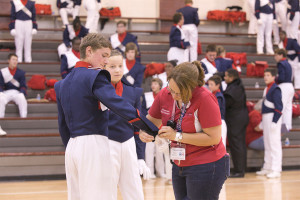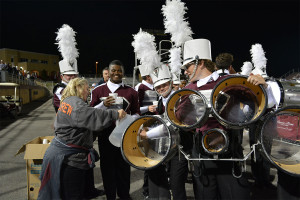Booster members operate with machine-like precision—though with hearts of gold—on game day and competition day.
As vice president of operations for the Franklin (Tennessee) High School Band Boosters, Donnie Grasso wakes up in the wee hours of the morning—3 a.m. isn’t unheard of—to get the band moving on competition day. He looks up traffic reports, converses with drivers, makes sure kids get on the buses and have breakfast to go. Then he gets a 15-minute head start over to the show site, so he can gauge traffic in real time. When he arrives on site, he helps unload and push out the equipment.
“My job is to make sure everything is happening when it’s supposed to happen … moving the band around and making sure the kids get everything they need,” Grasso says. “I don’t’ want [the director] to worry about anything but the music and the show.”
Grasso relies on a big team. He oversees chaperones, the pit crew, food staff and more. This same scenario plays out with marching bands all over the country.
Chaperones
 The Lafayette Band in Lexington, Kentucky, has about 80 volunteers involved on an event day, with 20 to 25 chaperones overseeing the students. The ratio for chaperones is often set by state regulations and includes medical volunteers to take care of minor injuries or illnesses.
The Lafayette Band in Lexington, Kentucky, has about 80 volunteers involved on an event day, with 20 to 25 chaperones overseeing the students. The ratio for chaperones is often set by state regulations and includes medical volunteers to take care of minor injuries or illnesses.
Chaperones hand out water, snacks and support the children emotionally. “We are the surrogate parent; we are the staff liaison,” says Mike Booth, lead chaperone at Lafayette. “Sometimes we’re the disciplinarians.”
 At Dobyns-Bennett High School in Kingsport, Tennessee, chaperones are split up by home and away teams with each having a different committee leader. The away team often has the added complexity of booking hotel rooms and coordinating room keys at check-in. In addition, each chaperone takes charge of overseeing three to four rooms, making sure students go to bed and wake up on time, among other things.
At Dobyns-Bennett High School in Kingsport, Tennessee, chaperones are split up by home and away teams with each having a different committee leader. The away team often has the added complexity of booking hotel rooms and coordinating room keys at check-in. In addition, each chaperone takes charge of overseeing three to four rooms, making sure students go to bed and wake up on time, among other things.
Equipment Crew
The equipment team is another huge crew that works on game day as well as behind the scenes—fabricating flags, building props and moving equipment out onto the field.
The 20 to 25 individuals at Dobyns-Bennett often have woodworking or engineering skills. Their minds are also constantly spinning, making sure props can withstand weather and other potential challenges. Lisa Bratton, co-president of the Dobyns-Bennett boosters, recalls a time when after coming home from a competition at 3 a.m., the equipment crew went back to work in the afternoon. “They’re calm under pressure,” she says.
Brasso trains freshmen parents to work football games and assigns experienced field members for competitions. “I want to make sure parents who are pushing for a competition know how it works and where all the equipment goes,” Brasso says. For example, “if there’s a gong on side one and if we’re going in on side one, they know that the side two equipment goes in first, so at the stadium, I don’t have to tell my pit crew anything.”
Uniform Crew
And, of course, no marching band is complete without uniforms and volunteers to manage them. The Lafayette Band organizes uniforms on seven racks, which take up an entire 27-foot truck while traveling. Because of their white bibbers, students never take home the uniforms. About 12 parents take charge on event day, one per rack plus someone for gloves and extras to help fix students’ hair.
“We go around and adjust uniforms to make sure they look as good as possible,” says Amy King, Lafayette’s uniform crew chief.
In fact, the Lafayette Band has taken several steps to make sure that the uniform pants stay white during a performance. At home games, the crew covers the bleachers with plastic. And at one specific competition where kids get ready in the host school’s cafeteria, parents use shower caps to cover the round stools. “You can imagine that in a cafeteria, the seats can get kind of grimy,” King says. “We are not above extreme measures to keep those pants clean.”
During event day, parents also put plumes and gauntlets on the performers. “If you’re on uniform crew, you get to plume your own kid,” King says. “It’s a special bonding moment.”
Overall, the uniform members feel a special connection with the band members and even give every student a special trinket at their last performance.
“We kind of have a backstage pass and can give the kids a good luck hug or give them encouragement before they go on the field,” King says. “When they come back, and if they had a bad run, I’ve had several kids cry on my shoulder. If they had a great run, you get to celebrate with them.”
One Big Team
Communication and team unity play a huge role in making day-of operations run smoothly. “We utilize emails, monthly board meetings, weekly logistic meetings, newsletters, phone calls and the website to accomplish this,” Bratton says.
At the Lafayette Band, each crew chief carries a two-way radio during the event. “Anytime somebody needs something uniform-related, they holler for me over the radio,” King says. “It’s really amazing the system that’s been in place for years with how we all coordinate to get those kids on the field.”
The teams are able to function so well together because of their own bonding traditions. For example, the uniform team meets for breakfast before competitions while chaperones each receive a lollipop.
“Find ways to create that unity and teamwork,” Booth says. “Things don’t always go the way you think they will. The stronger the team you are, the better way you will react because you have this common way of thinking.”
Being a band volunteer takes a special kind of sacrifice with long days and no pay; however, the committed parents love every minute. “Marching band changes the kids and many times the parents too,” Grasso says. “It all boils down to staying focused, going in with the right heart, knowing you’re there to support the kids and the band director, and the fruit of that is great at the end.”


